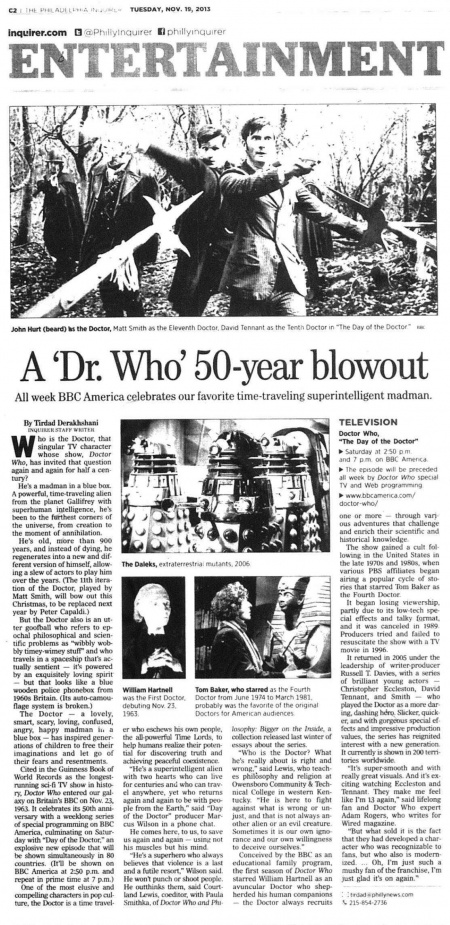A Dr. Who 50-year blowout
- Publication: The Philadelphia Inquirer
- Date: 2013-11-19
- Author: Tirdad Derakhshani
- Page: C2
- Language: English
All week BBC America celebrates our favorite time-traveling superintelligent madman.
Who is the Doctor, that singular TV character whose show, Doctor Who, has invited that question again and again for half a century?
BBC John Hurt (beard) as the Doctor, Matt Smith as the Eleventh Doctor, David Tennant as the Tenth Doctor in "The Day of the Doctor."
He's a madman in a blue box. A powerful, time-traveling alien from the planet Gallifrey with superhuman intelligence, he's been to the furthest corners of the universe, from creation to the moment of annihilation.
He's old, more than 900 years, and instead of dying, he regenerates into a new and different version of himself, allowing a slew of actors to play him over the years. (The 11th iteration of the Doctor, played by Matt Smith, will bow out this Christmas, to be replaced next year by Peter Capaldi.)
But the Doctor also is an utter goofball who refers to epochal philosophical and scientific problems as "wibbly wobbly timey-wimey stuff" and who travels in a spaceship that's actually sentient — it's powered by an exquisitely loving spirit — but that looks like a blue wooden police phonebox from 1960s Britain. (Its auto-camouflage system is broken.)
The Doctor — a lovely, smart, scary, loving, confused, angry, happy madman in a blue box — has inspired generations of children to free their imaginations and let go of their fears and resentments.
Cited in the Guinness Book of World Records as the longestrunning sci-fi TV show in history, Doctor Who entered our galaxy on Britain's BBC on Nov. 23, 1963. It celebrates its 50th anniversary with a weeklong series of special programming on BBC America, culminating on Saturday with "Day of the Doctor," an explosive new episode that will be shown simultaneously in 80 countries. (It'll be shown on BBC America at 2:50 p.m. and repeat in prime time at 7 p.m.)
One of the most elusive and compelling characters in pop culture, the Doctor is a time traveler who eschews his own people, the all-powerful Time Lords, to help humans realize their potential for discovering truth and achieving peaceful coexistence.
"He's a superintelligent alien with two hearts who can live for centuries and who can travel anywhere, yet who returns again and again to be with people from the Earth," said "Day of the Doctor" producer Marcus Wilson in a phone chat.
He comes here, to us, to save us again and again — using not his muscles but his mind.
"He's a superhero who always believes that violence is a last and a futile resort," Wilson said. He won't punch or shoot people. He outthinks them, said Courtland Lewis, coeditor, with Paula Smithka, of Doctor Who and Philosophy: Bigger on the Inside, a collection released last winter of essays about the series.
"Who is the Doctor? What he's really about is right and wrong," said Lewis, who teaches philosophy and religion at Owensboro Community & Technical College in western Kentucky. "He is here to fight against what is wrong or unjust, and that is not always another alien or an evil creature. Sometimes it is our own ignorance and our own willingness to deceive ourselves."
Conceived by the BBC as an educational family program, the first season of Doctor Who starred William Hartnell as an avuncular Doctor who shepherded his human companions — the Doctor always recruits one or more — through various adventures that challenge and enrich their scientific and historical knowledge.
The show gained a cult following in the United States in the late 1970s and 1980s, when various PBS affiliates began airing a popular cycle of stories that starred Tom Baker as the Fourth Doctor.
It began losing viewership, partly due to its low-tech special effects and talky format, and it was canceled in 1989. Producers tried and failed to resuscitate the show with a TV movie in 1996.
It returned in 2005 under the leadership of writer-producer Russell T. Davies, with a series of brilliant young actors — Christopher Eccleston, David Tennant, and Smith — who played the Doctor as a more daring, dashing hero. Slicker, quicker, and with gorgeous special effects and impressive production values, the series has reignited interest with a new generation. It currently is shown in 200 territories worldwide.
"It's super-smooth and with really great visuals. And it's exciting watching Eccleston and Tennant. They make me feel like I'm 13 again," said lifelong fan and Doctor Who expert Adam Rogers, who writes for Wired magazine.
"But what sold it is the fact that they had developed a character who was recognizable to fans, but who also is modernized. … Oh, I'm just such a mushy fan of the franchise, I'm just glad it's on again."
Disclaimer: These citations are created on-the-fly using primitive parsing techniques. You should double-check all citations. Send feedback to whovian@cuttingsarchive.org
- APA 6th ed.: Derakhshani, Tirdad (2013-11-19). A Dr. Who 50-year blowout. The Philadelphia Inquirer p. C2.
- MLA 7th ed.: Derakhshani, Tirdad. "A Dr. Who 50-year blowout." The Philadelphia Inquirer [add city] 2013-11-19, C2. Print.
- Chicago 15th ed.: Derakhshani, Tirdad. "A Dr. Who 50-year blowout." The Philadelphia Inquirer, edition, sec., 2013-11-19
- Turabian: Derakhshani, Tirdad. "A Dr. Who 50-year blowout." The Philadelphia Inquirer, 2013-11-19, section, C2 edition.
- Wikipedia (this article): <ref>{{cite news| title=A Dr. Who 50-year blowout | url=http://cuttingsarchive.org/index.php/A_Dr._Who_50-year_blowout | work=The Philadelphia Inquirer | pages=C2 | date=2013-11-19 | via=Doctor Who Cuttings Archive | accessdate=5 February 2026 }}</ref>
- Wikipedia (this page): <ref>{{cite web | title=A Dr. Who 50-year blowout | url=http://cuttingsarchive.org/index.php/A_Dr._Who_50-year_blowout | work=Doctor Who Cuttings Archive | accessdate=5 February 2026}}</ref>
